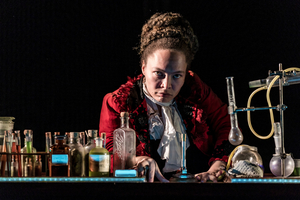Guest Blog: Evan Placey On Reworking JEKYLL & HYDE From A Female Perspective
The National Theatre production is now touring secondary schools

I'd not done an adaptation before. And I'd only once before written any drama based on existing material - for a 2012 verbatim play at the Unicorn Theatre, How was it for you? - but that was quite a different process. Whereas when doing a verbatim play I was taking things people had actually said and piecing it together, mapping it, distilling it down to its core, when I approached the Jekyll & Hyde adaptation, it was about doing the opposite: opening it up, creating missing scenes, finding dialogue where there previously wasn't any.
Or at least that's how it began. Because in the end I went quite a bit further than that, not so much expanding the novella by Robert Louis Stevenson, but completely gutting it.
I knew there was something to say about today with Stevenson's novella about good and evil and the darkness in all of us. I had the seed of an idea that we all had the potion to access our inner 'Hyde', to live out our darkest fantasies and desires, to experiment with various vices: the internet. Knowing I was writing this as a play for teenagers, that also felt a great way in to make this story they study at school feel fresh and relevant to them.
I'd imagined then that the adaptation would be a straightforward updating of the novella to a contemporary world. But as I started rereading the book I was struck by something strange: there were virtually no women in the novella. There's a girl who gets trampled on a couple of pages in, and a maid who opens a door later on, but otherwise it was all men.
Thorburn in Jekyll & Hyde
And it's not just an absence of women present in the story, it's an absence in the universe that Jekyll inhabits - no one even talks about or refers to women. So, like, where are they? I searched and searched at the margins of my pages - had they slipped off? Where were they hiding?
What did their absence from the story tell us about the Victorian London depicted in the book? And what did it feel like reading this book as a young woman today in school? And what opportunity did this now present in bringing the play to audiences of teenagers around the country?
I quickly got inspired. I no longer wanted to set the whole thing in a contemporary world. I wanted to revisit the original setting of Stevenson's novella - but through the eyes of the women. To explore the misogyny and sexism of the world. The violence against women.
And a provocative question kept rearing its head: in a world ruled by violent men, was the only way to elicit change to use violence back? To make men feel the violence that women feel? And I think it's this question that permeates the whole play. As echoes of the past push their way into the modern world (and vice versa), I kept asking myself (and so does the play therefore) what had to happen for everlasting change?
The reality of upending the novella in this way - to experience it through women, where there are none in the original - meant that much of the original had to go. It was still there in the story world and tone and themes, but much of the original plot had to be chipped away at until very little remained.
in Jekyll & Hyde
I remember a day in one of our rehearsals when the director, Kirsty Housley, suggested a line cut. A line that felt unnecessary. It was, at that point, the only line left in the play that actually came from the original book. But the play had come into its own by then; it was and is now its own beast. The line went.
So is this an adaptation? A reimagining? An "inspired by"? A sequel? I have no idea. But when I set out at the start, my aim was to find the heart of the book and make sure it was preserved. And I think despite the different body and clothes, that the heart of the original is still hidden there beneath.
I hope that the 10,500 young people who experience the play over the coming weeks get inspired to look at books they thought they knew and view them in new ways. And see how literature of the past can still speak to us today.
The National Theatre is touring Evan Placey's reimagining of Jekyll & Hyde into secondary schools across the UK as part of its Theatre Nation Partnerships initiative to grow and sustain new audiences for theatre. The production will be visiting schools across Wolverhampton, Greater Manchester, Sunderland, Doncaster, outer East London and Wakefield in partnership with local theatres. Find out more here
Photo credit: The Other Richard
Comments

Videos

